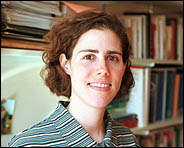Kara Joyner
| If McGill is looking to knock down some stereotypes about stuffy scholars who pursue unsexy topics, the recent hire of Kara Joyner might be a part of its image overhaul strategy.
 PHOTO: OWEN EGAN
PHOTO: OWEN EGAN
| |
The sociology professor brings a decidedly postmodern flair to the Faculty of Arts: studies about teenagers and sex, how interracial relationships develop and differences between couples who marry and those who co-habit — Joyner's résumé reads like an academic digest of the Oprah Winfrey Show.
"My work has tended to focus on family-related behaviour and its consequences for the psychological well-being of individuals," Joyner says.
Recently, Joyner was put in the spotlight when the media picked up on "Teenage Sex and the Sexual Revolution," a study she co-authored which draws a link between the age at which adolescents begin engaging in sexual activity and their intelligence.
In the study of teenagers ranging from grades seven through 12, Joyner found that individuals with higher IQ levels tended to have sexual relationships later than those of average intelligence. Joyner says that these results were not surprising, assuming that smarter students were being careful to safeguard their future career aspirations against pregnancy and STDs.
"However, it became more complicated when our data indicated that students of below-average levels of intelligence were also having sex later," Joyner explains. She had anticipated a linear relationship between the age when teens become sexually active and their intelligence, rather than one that resembled a bell curve. "We can't explain why this is the case, other than to assume that family intervention played a role in protecting those individuals."
Joyner was hired by McGill just after she'd completed post-doctoral work at the University of Chapel Hill-North Carolina. There, she'd studied why co-habiting couples are more likely to break up than those who are married. Turns out that while both married and co-habiting couples perceive relationship inequities (read: squabble), it's within the less structured live-in situations that the perceived imbalance results in the termination of a relationship.
A native of Tennessee, Joyner admits to having experienced a little culture shock upon arriving in Quebec. "I thought Chicago [where Joyner earned her PhD] was a diverse city. But then I came to Montreal, where there aren't just pockets of different cultures, but where you see diversity in all its forms everywhere," she recounts. "It took a little adjustment."
Joyner was attracted to McGill after a little investigative work. "McGill's reputation as an excellent university was a major draw," she states, "and I couldn't pass up the opportunity to work with sociologists whose work I really admired."
Currently, she is examining how interracial platonic and romantic relationships between adolescents are formed; specifically, the effects of school racial composition on the chances of developing these relationships. The idea is that the greater the opportunity to meet members of other races, the more likely one would be to make friends with them.
"This happens, but not to the extent that you would expect them to," Joyner points out. "For example, in a school with 50 percent white students and 50 percent non-white students, one might assume that relationships would be 50 percent white and 50 percent non-white." But Joyner says that the incidence of interracial relationships statistically favours members of their own culture.
"People still have a bias toward their own race," she says.

